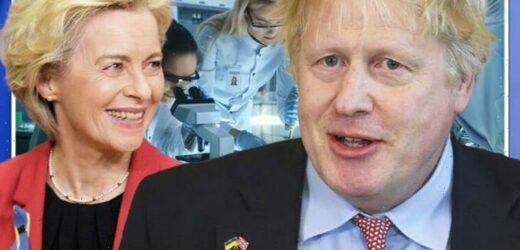Brexit: Freeman slams 'aggressive' EU checks on Newsnight
We use your sign-up to provide content in ways you’ve consented to and to improve our understanding of you. This may include adverts from us and 3rd parties based on our understanding. You can unsubscribe at any time. More info
Horizon Europe is the EU’s £80billion plan for R&D that the UK has been left out of over Brexit disputes. Britain was told it cannot participate in the project, which allows access to the huge pool of funding and collaboration with Europe across a range of scientific sectors until the political feud blows over. The UK was supposed to contribute £15billion over a seven-year period as part of its associated member status.
But now it is thinking twice about re-joining the project, which it was originally meant to take part in as part of the UK-EU Trade and Cooperation Agreement (TCA).
That is because the UK can strike deals with countries outside the bloc with far less beurocracy instead, which Science Minister George Freeman has argued have a “better quality” research culture.
Switzerland is another nation that was also banned from Horizon Europe over a political dispute.
Mr Freeman announced that Britain could partner up with the “science and innovation powerhouse” as part of his £6billion backup plan after a visit to Geneva in February.
The Science Minister’s “Plan B” may also involve teaming up with the UK’s Five Eyes partners (Australia, Canada, New Zealand and the US), as well as Japan and elsewhere.


Speaking to the Science and Technology Committee several months ago, Mr Freeman even agreed that universities in the US, Australia and Asia are of “better quality” than our European partners.
He also headed to Tel Aviv last month to explore collaboration with Israel.
The country is already Britain’s top collaborator in the Middle East and is considered a world leader in a number of scientific domains like stem cell research and computer sciences.
Mr Freeman tweeted: “Thank you to all the brilliant scientists, entrepreneurs, investors and policymakers in Israel for a brilliant visit and agreement on a new UK-Israel R&D collaboration.”
Horizon Europe applicants in Britain have also been promised that they will receive grants they were supposed to collect through inclusion in the project.

The Government’s guarantee scheme should mean that bar some paperwork, researchers who won grants can still collect money from UK Research and Innovation (UKRI).
The UK may have also dodged a bullet after researchers unleashed fury over the bureaucratic processes involved in the Horizon Europe association.
In an online survey by Science|Business, consisting of many researchers associated with the scheme, many participants did not seem happy about the application process.
It revealed that 52 percent believe the process is too bureaucratic, while 70 percent said the odds of winning are too low.
But despite this, Britain has still been left in a difficult position since being excluded.
DON’T MISS
UK makes another ‘stunning’ nuclear fusion breakthrough: World-first’ [REVEAL]
Putin’s plot to hold Germany to ransom could end in disaster [INSIGHT]
Orban leads EU revolt of FIVE states against Russia energy sanctions [REPORT]

Mr Freeman told the Science and Technology Committee last month: “We’ve been very clear that we can’t be in a situation where the uncertainty of being blocked damages UK science and research today.”
But the Science Minister laid out a plan to free itself from the EU shackles once and for all, involving three distinct pillars.
He told the Committee: “Firstly the talent, I’ve suggested that if we have to do it our own we put more into those talent pillars than traditionally we’ve done and we make them slightly longer term and base them on some of our academy fellowships.
“Secondly, the industrial pillar, where I would argue that the industrial involvement of UK companies has been quite low.

“I think if we frame those around industrial challenges, we could get more money in from industries.
“The innovation pillar where again actually UK entrepreneurial and VC investment has been quite low because it’s an academic program.
“I think we can do that we do that better and get more engagement.”
He then continued to outline “three new pillars” that would set the UK’s plan B apart, which would focus on the space industry, multilateral and bilateral collaboration outside the EU, and a “much bigger commitment to global challenges.”
Source: Read Full Article


